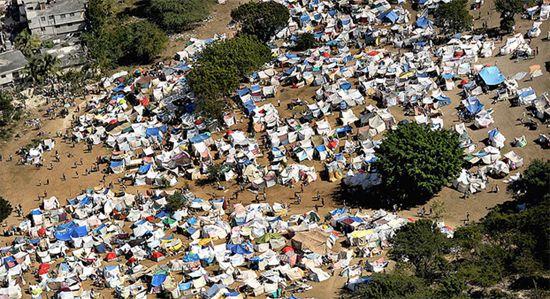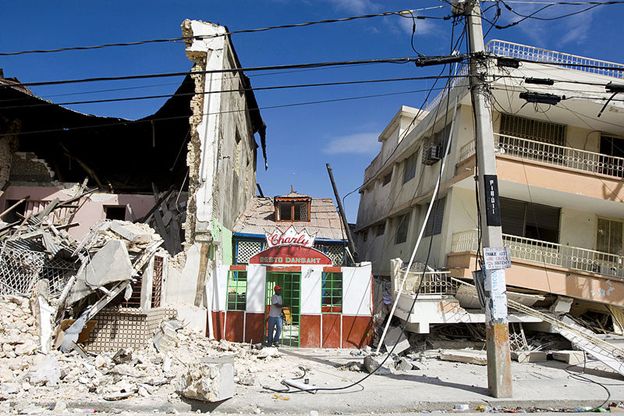On Tuesday,12 January 2010, four years ago, a catastrophic magnitude 7.0 earthquake hit Haiti. killing more than 300,000 people and leaving countless numbers of people homeless. Memorial services were held in Haiti Sunday, and in the U.S. where there is a population of over 830,000 Haitian-Americans, and in other parts of the Haitian diaspora.
Please take a moment of silence in memory, and then be silent no more. Time for screams of outrage.
Amnesty International researcher Chiara Liguori, wrote:
Unsurprisingly, in the aftermath of the earthquake, Haiti was headline news across the globe. Yet four years on, with the cameras gone, the problems and suffering of the people remain.
It is estimated that almost 150,000 people are still living in 271 displacement camps, often in appalling conditions. The lack of access to basic services such as safe water, sanitation and waste disposal leaves them exposed to the risk of cholera and other diseases. Many still live in makeshift shelters, vulnerable to flooding, especially during hurricane season.
It’s unacceptable enough that people are still living like this. But many Haitians living in displacement camps also have to contend with the constant fear of being forcibly evicted. Since 2010, more than 60,000 people have been forced from their makeshift shelters, and it is estimated that almost half of those living in displacement camps face the ongoing threat of forced eviction.
Amnesty International denounced the situation in a report released last April in Port-au-Prince, the Haitian capital. The country’s authorities reacted promptly and committed themselves to thoroughly investigating the evictions. Yet no perpetrator has, to our knowledge, been brought to justice. And while the evictions stopped for a couple of months, they have continued again since June.
How easy for many of us to ignore what is happening there. We tend to ignore the Caribbean in general, and Haiti gets the shortest shrift.
Exploiters of Haiti haven’t failed to pay attention however, even though we were lulled after the media explosion of interest four years ago.
This exploitation has been dubbed “disaster predation”
Instead of bringing relief to Haitians, the world’s generosity in response to the Earthquake merely brought the country to the attention of its most rapacious disaster predators. Almost immediately, and despite a ban on adoptions, numerous plane loads of children were transported to the U.S., France, and Holland. The removal of a group’s youngest citizens has traditionally been the way to undermine a culture; this continues at a rate of about 2,000 children per year from Haiti. In the political sphere, by Spring 2010, former U.S. President Clinton had managed a coup that forced an 18-month State of Emergency onto the country and brought it under the rule of a group of wealthy investors called the Commission for the Reconstruction of Haiti (CIRH). This group has been dismantled, but only because it became incorporated into the government after the fraudulent elections of 2010-2011. For example, CIRH member Laurent Lamothe became Haiti’s Prime Minister; other members Gregory Mevs (of Haiti’s wealthy family) and Bill Clinton are the co-chairs of the so-called Presidential Advisory Council for Economic Growth and Investment. Thus far, the crowning achievement of this group has been the inauguration, on October 22, 2012 of Haiti’s Caracol Industrial Park: a massive sweatshop zone that employ workers for a maximum of $0.87 per hour. The toxic dyes from the park and the influx of population into this previously rural area are expected to destroy a river and the neighboring coast. Despite the Haitian Constitution’s clear statements that “coasts, springs, rivers, water courses, mines, and quarries” are a commons, the CIRH veterans have set about to sell all of them. Many farmers who opposed the landgrabs have paid for it with their lives.
(my bold)
There are a lot of bad guys in this. The usual suspects. But I appeal to Democrats to castigate Bill Clinton, along with the current Obama administration’s foreign policy (which is no better or worse than any U.S. policy historically for Haiti under any administration) and the Congress.
I have made my beliefs clear in the past about Haiti, in posts like “Haitians fought in our Revolutionary War…we turned our backs on theirs” and why I feel Haiti is still paying the price for having had the audacity to free itself from the yoke of slavery over 200 years ago.
So as we remember, let us not remain silent. Haiti may not be in our headlines, but it should be in our hearts and a part of our activism.
Cross-posted from Black Kos


13 comments